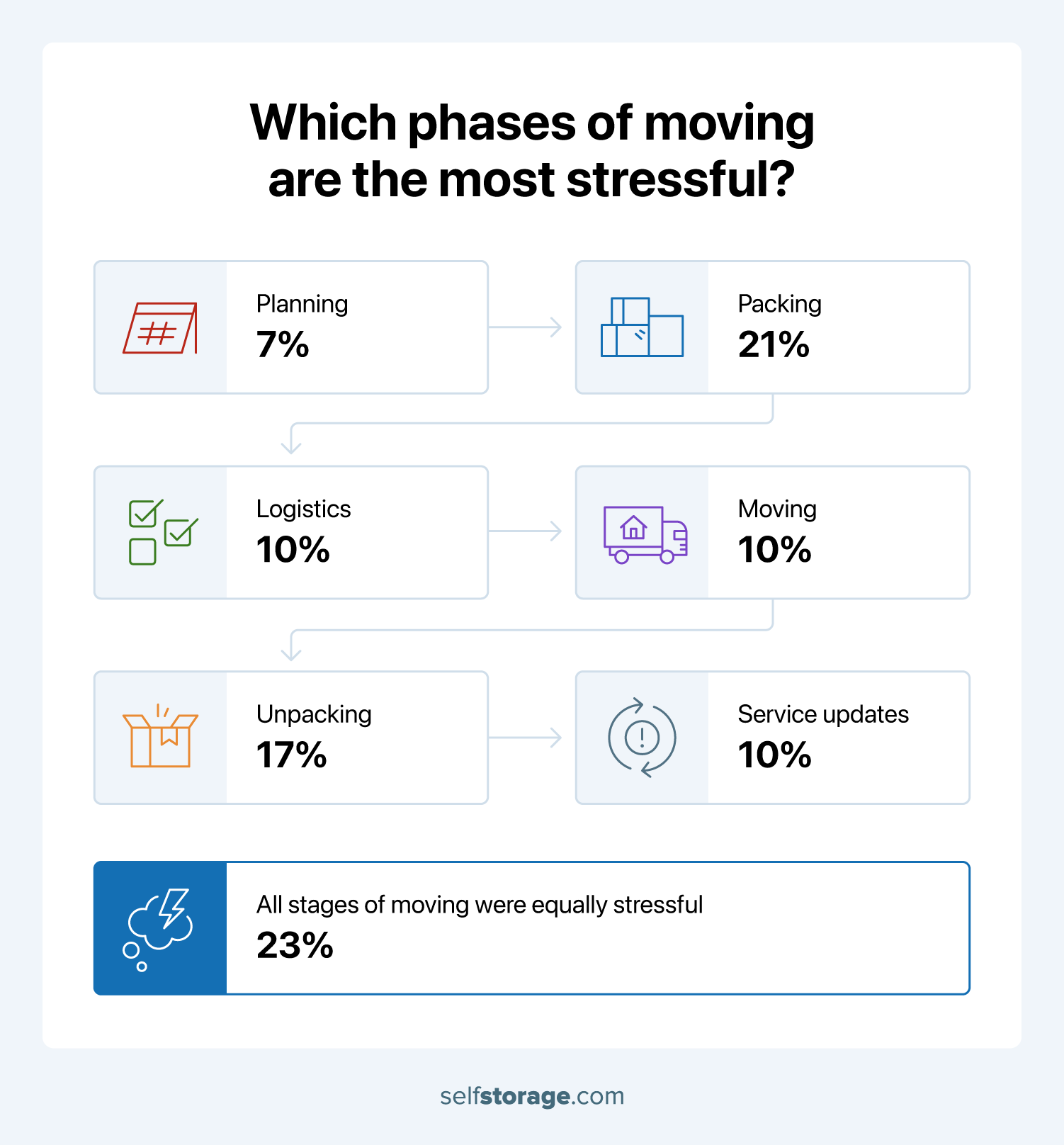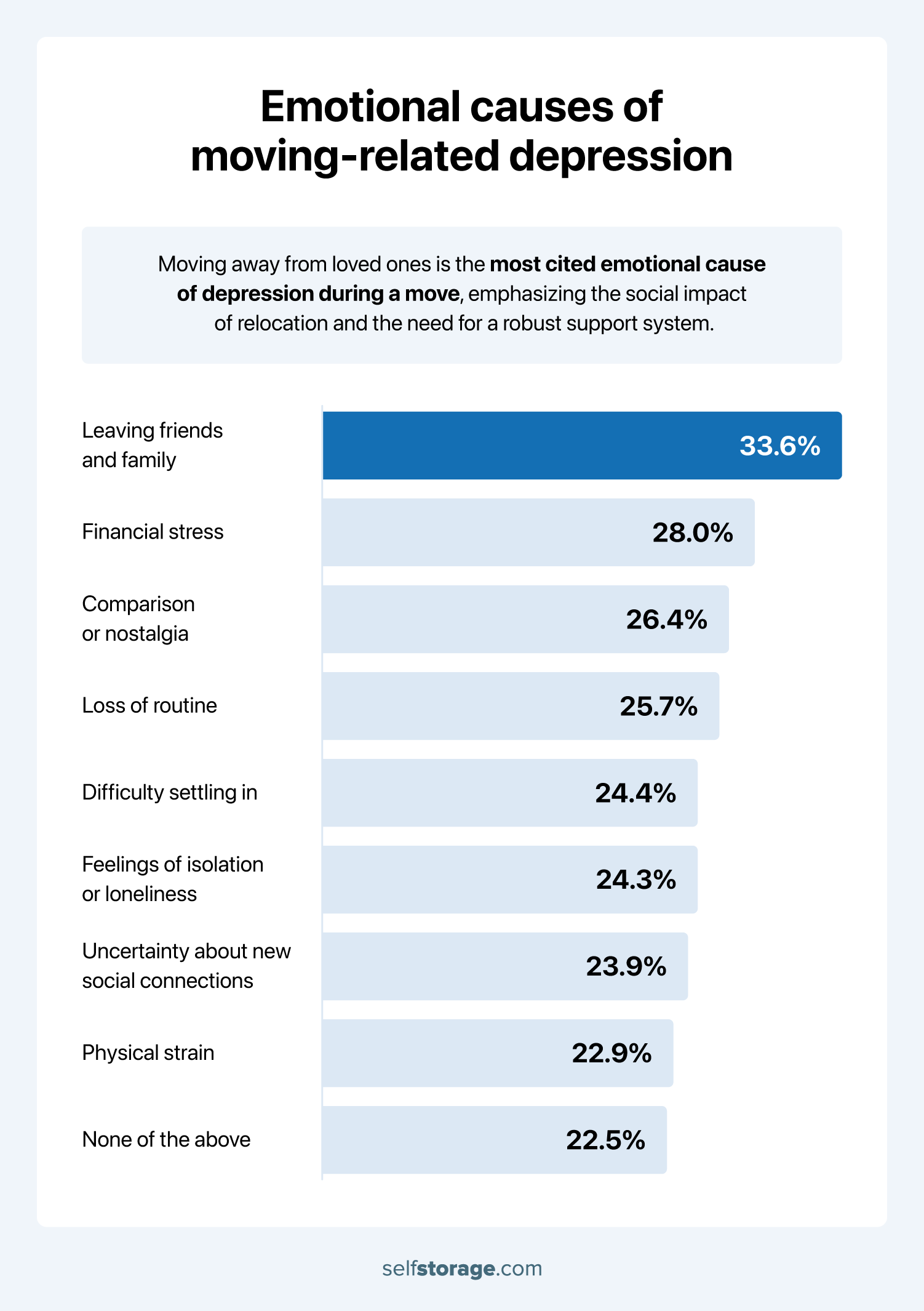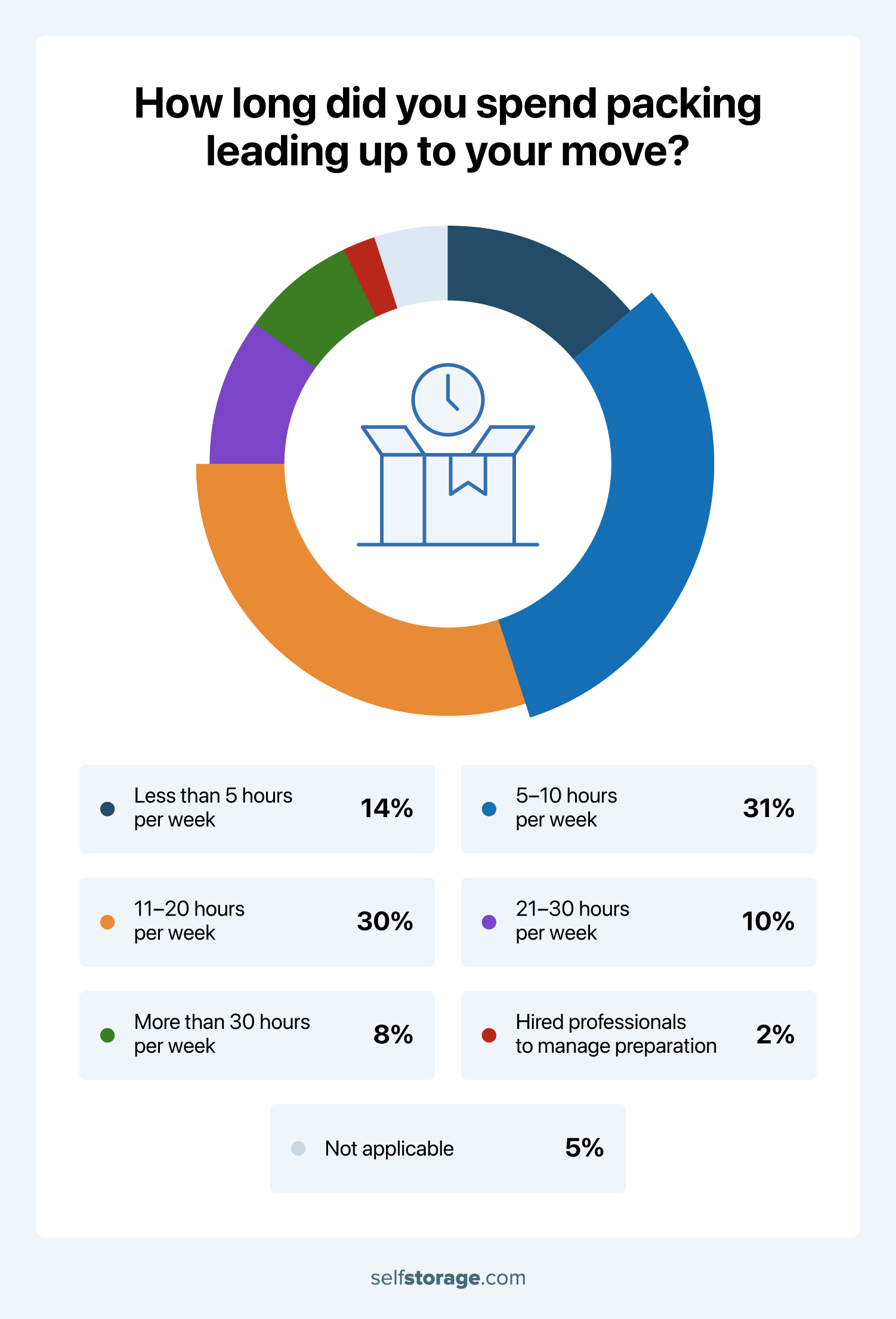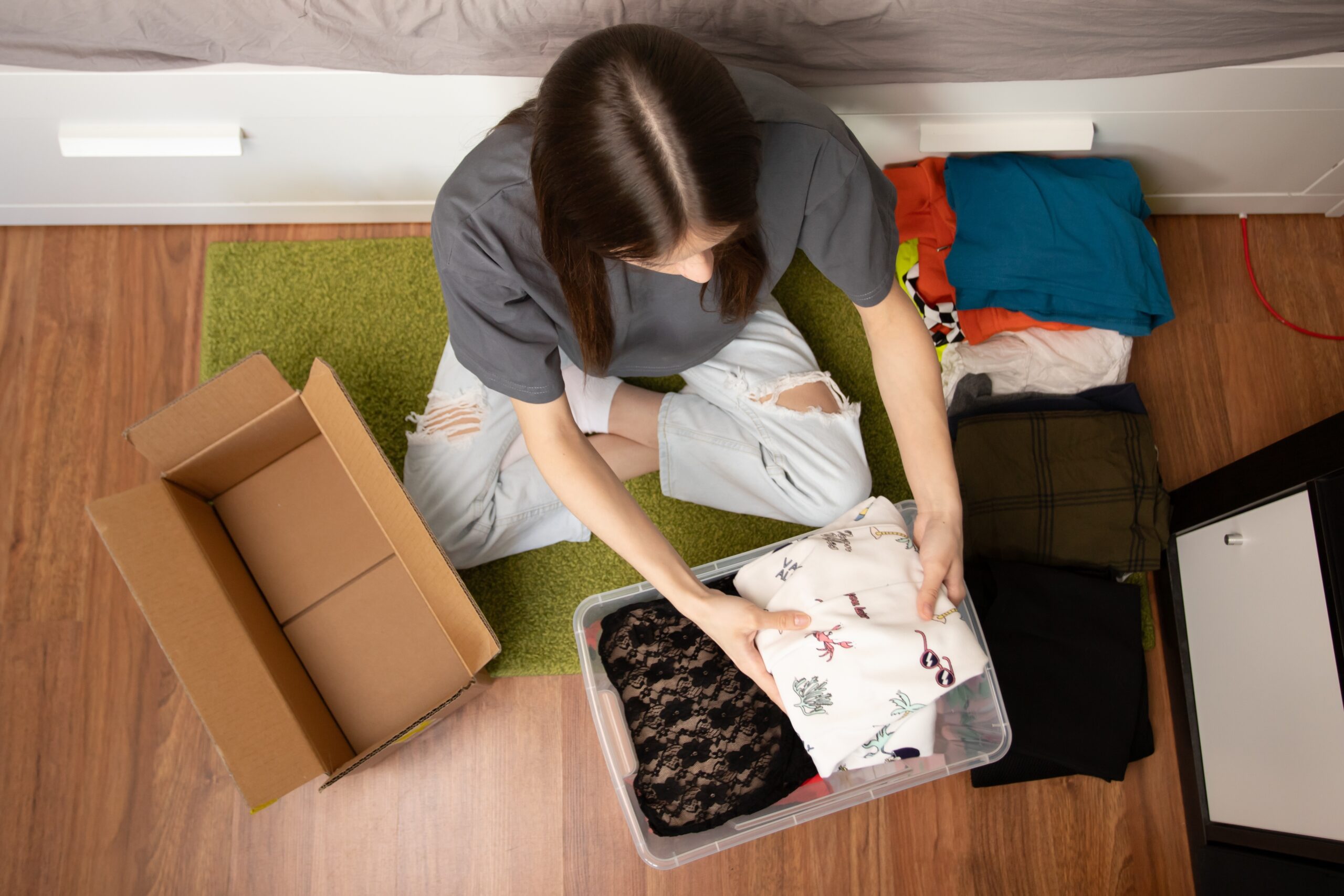Moving anxiety can come for anyone, often taking center stage soon after you know you’re relocating. It’s that knot in your stomach when you think about packing every single item you own, coordinating logistics, and saying goodbye to a familiar space.
This isn’t just a minor inconvenience; it’s a disruptive experience affecting a huge chunk of the population. Our recent survey revealed just how common this feeling is, with nearly three-quarters of Americans (74%) admitting they’ve experienced anxiety around a move.
While Americans dread the planning and packing stages of moving, the promise of a fresh start keeps them moving. Knowing the dos and don’ts of moving can set you up for success, and based on our findings, the clearest path to alleviating moving anxiety begins with proactive pre-move preparation.
Article takeaways
- Nearly 75% of Americans report feeling stressed, anxious, or overwhelmed before a move.
- Similarly, 73% of Americans have experienced feelings of sadness or depression surrounding a move.
- Despite being a necessary part of the process, decluttering, downsizing, and packing contribute to stress for more than 50% of Americans.
- Decluttering well in advance is one of the best ways to relieve moving stress, according to 39% of Americans.
Moving Anxiety Affects Nearly 75% of Americans
Moving is an emotional marathon that impacts nearly three-quarters of Americans. Our survey found that while more than one-third (37%) feel a mix of both stressed and excited, stress is the predominant emotion associated with moving: Nearly 1 in 5 report feeling stressed or anxious, and over 18% feel overwhelmed ahead of a move.

The emotional toll can exceed stress, as nearly three-quarters of Americans have felt depressed before and/or after a move. The most common causes of these feelings include leaving friends and family behind (33%), navigating financial stress (28%), and feeling nostalgic or comparing their new home to their previous residence (26%).
Finding ways to save money on your move can certainly alleviate some stress, but because several factors contribute to moving anxiety, managing it often requires proactive planning and a strategic approach.

More Than Half Blame Decluttering and Packing for Their Moving Anxiety
If the thought of sorting through years of accumulated belongings makes you sweat, you’re not alone. For more than 50% of Americans, packing is the most stressful phase of moving, accounting for decluttering and downsizing tasks. While figuring out how to pack and actually making the move tend to be some of the most stressful parts of relocating, more than 1 in 5 respondents indicated that all stages were equally stressful.
And even though decluttering is one of the most stressful parts of moving, nearly 2 in 5 Americans say that undertaking the task well in advance helps relieve their stress — making it the most-cited way to reduce moving anxiety.
Around one-third of Americans report feeling too overwhelmed to unpack, leading to boxes lingering for weeks or months after moving day. Having a plan in place for packing and unpacking can help prevent this kind of stress, so you can more easily settle into your new home.

Why Is Moving So Stressful?
The stress of moving stems from a combination of practical challenges and emotional disruptions.
Leaving behind friends and family was the top reason for feelings of depression, with one-third of Americans indicating the change as a likely cause. Unsurprisingly, financial stress also contributed to these feelings for 28% of respondents.
Moving is a complicated and overwhelming process, and several factors may contribute to anxiety and sadness, including:
- Loss of the familiar: More than 1 in 4 Americans find that the disruption to their daily routines, habits, and familiar surroundings is a significant cause of moving-related depression.
- Financial stress: In addition to causing feelings of depression, financial stress also contributes to stress for more than 1 in 3 Americans.
- Uncertainty and instability: Questions about a new neighborhood, finding new social connections, or even adjusting to a different pace of life can contribute to feelings of depression for nearly 24% of Americans.
- Emotional distress: Leaving your home, experiencing social changes, and other sources of emotional stress are major contributors to moving anxiety for 43.8% of Americans.
- Adjusting to a new environment: The period of settling into a new home and integrating into a new community can be tough, contributing to sadness for at least 24.4% of Americans.
How To Cope With Moving Anxiety
Moving can be a significant source of stress and anxiety, but proactive strategies can help alleviate these feelings. While Americans often pour hours into a DIY approach for moving preparation, smart strategies like early decluttering and detailed planning are highly effective in minimizing stress.
1. Make a Plan
Making a detailed plan in advance is an effective way to alleviate moving anxiety for more than one-third of Americans. Creating a comprehensive moving inventory list and task checklist, setting timelines for each stage, and organizing important documents can bring a sense of control to an otherwise chaotic process.
Consider mapping out your new home’s layout, planning where furniture will go, and even scheduling utilities in advance. A good plan acts as a roadmap, guiding you through each step and reducing feelings of overwhelm.
2. Declutter in Advance
Even though decluttering and packing are some of the most stressful parts of moving, doing so well before the move is the top anxiety alleviator for nearly 40% of Americans. By decluttering early, you can sort through your belongings at a relaxed pace, deciding what to keep, donate, sell, or discard.
Of those who cited decluttering as a stressful process, nearly 45% indicated that tackling the process ahead of time would alleviate their anxiety, and 41% expressed that creating a detailed plan in advance would have a similar effect, suggesting that being proactive and having more time to prepare are key to minimizing moving stress.
3. Take Time Off Work To Prepare
Taking time off work can significantly help alleviate moving anxiety, according to 33.27% of respondents. Achieving a healthy work-life balance is a struggle for many Americans, and when you throw the stress of moving into the mix, it becomes even more challenging.
For 38% of Americans, balancing family responsibilities, work, and the moving process is a significant source of stress, and nearly 20% have experienced a decrease in work productivity as a result.
Dedicating specific days or even a full week to packing, coordinating logistics, and addressing last-minute tasks can reduce the pressure of juggling professional responsibilities with moving demands.
4. Consider Self-Storage Options
A lack of storage is a leading cause of clutter for more than two-thirds of Americans, and 17% find that self-storage helps relieve their moving stress.
Moving non-essential items or furniture into a storage unit can reduce clutter in your home, allowing for easier cleaning, packing, and staging for sale. This can also provide a buffer during unforeseen delays, ensuring your belongings are safe and accessible.

Keep your belongings safe and accessible
Find self-storage options near you!5. Ask for Help
Getting help can significantly reduce the burden and stress of moving.
Full-service movers are most valued for a smooth move, with 31.4% of Americans indicating that this service would help reduce their moving stress.
Depending on your budget and how much you want to be involved in the moving process, you can get help from different sources, such as:
- Friends and family: Recruit your loved ones to assist with packing, moving, or unpacking — and be sure to offer them food, drinks, or future favors in return for their assistance.
- Packing services: Have someone else put your belongings in organized, labeled boxes to reduce the stress of sorting and packing.
- Professional movers: For the most hands-off approach, full-service movers can handle everything from packing to unloading, reducing physical and logistical strain.
- Organization services: Professional organizing and decluttering services can be invaluable for tackling the overwhelming task of decluttering before, during, or after your move.
6. Try Stress Management Techniques
Amidst the chaos of moving, incorporating stress management techniques can be surprisingly effective at keeping you level-headed, according to 21% of Americans. These practices can help you maintain a sense of calm and clarity throughout the process. Some of the most common practices include:
- Setting reasonable expectations: Understand that not everything will go perfectly, and that’s OK. Focus on what you can control.
- Practicing mindfulness and meditation: Even a few minutes of deep breathing or guided meditation can help calm a racing mind.
- Prioritizing your sleep schedule: Make sure you get enough rest, even when it feels impossible.
- Eating a balanced diet: Fuel your body with nutritious food to maintain energy levels and mood stability.
- Staying physically active: Physical activity is a popular stress reliever. Schedule walks or workouts to break up your moving tasks.
Make the Stress of Moving More Manageable With Self-Storage
No matter how many times you’ve moved, you may still feel tense, stressed, and on edge when you have to start packing. Given the elevated levels of moving anxiety that stem from decluttering and downsizing before a move, the best solutions may involve a proactive approach to packing and finding extra storage to minimize clutter.
By making a plan, decluttering early, and using helpful resources like self-storage, you can turn a potentially overwhelming experience into a smoother, more manageable fresh start.
Ready to conquer your next move? Let us help you take the first step toward a stress-free relocation.

Ready to conquer your next move?
Find self-storage options near you!Methodology
We surveyed 1,010 U.S. adults ages 18 and over via SurveyMonkey Audience for SelfStorage.com, LLC on June 25, 2025. Data is unweighted, and the margin of error is approximately +/-3% for the overall sample with a 95% confidence level.
FAQs
- Making a detailed plan
- Decluttering and packing early
- Using helpful services like self-storage
- Recruiting the help you need in advance
If these symptoms are severe or long-lasting, consulting a mental health professional is always recommended.
- The emotional stress of leaving your current home, social circles, and familiar surroundings
- The burden and overwhelm of decluttering, downsizing, and packing
- The costs associated with moving, as well as changing expenses
- Doubts about the new location or finding new connections
- Make a plan: Organize your tasks and timeline in advance.
- Declutter early: Reduce the volume of items you need to move well before moving day by downsizing or using a storage facility.
- Ask for help: Don’t be afraid to enlist friends, family, or professional services like movers or packers to relieve some of your stress.
- Prioritize self-care: Incorporate stress management techniques like exercise, mindfulness, and adequate sleep.








![Survey: Nearly Half of Movers Take Months To Finish Unpacking [+ 10 Unpacking Tips]](https://moving.selfstorage.com/wp-content/uploads/2025/06/how-to-unpack-after-moving-hero.jpg)